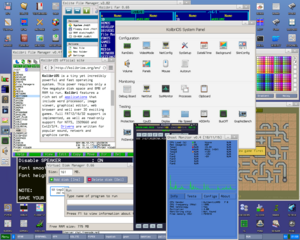 | |
| Developer | KolibriOS Project Team |
|---|---|
| Written in | FASM |
| Working state | Active |
| Source model | Open source |
| Latest release | 0.7.7.0 / December 13, 2009[1] |
| Repository | websvn |
| Available in | English, Russian, Italian, Spanish |
| Platforms | x86 |
| Kernel type | Monolithic[2] |
| Default user interface | KolibriOS Kernel API |
| License | GPL-2.0-only with binary blobs[3] |
| Preceded by | MenuetOS |
| Official website | www |
KolibriOS, or Kolibri, is a small, open-source x86 operating system written completely in assembly.[4] It was forked from MenuetOS in 2004 and has run under independent development since.[5]
In a 2009 review piece on alternative operating systems, TechRadar called it "tremendously impressive", noting its performance and streamlined codebase.[6]
YouTube Encyclopedic
-
1/1Views:527
-
Kolibri OS: Startup speed (power of assembly)
Transcription
Features
- Pre-emptive multitasking, streams, and parallel execution of system calls
- Boots in a few seconds from various devices, with support for NTFS, Ext2/3/4, FAT12/16/32, exFAT, and ISO9660;[5] can also boot from Coreboot and Windows (Windows will shut down)
- Graphical user interface based on, and optimised for, VESA
- Development kit: code editor with an integrated macro assembler (FASM)
- Most distributions will fit on a single 1.44 MB floppy disk image[7]
- Other practical applications such as a word processor, image viewer, and web browser[5]
Commands
The following is a list of commands supported by the KolibriOS Shell:[8]
System requirements
- i586-compatible CPU
- 8 MB of RAM[9]
- VESA-compatible graphics card
- 1.44 MB 3.5" floppy drive, hard disk drive, USB flash drive or CD-ROM drive
- Keyboard and mouse (COM, PS/2 or USB)
Supported hardware
- USB 1.1 and 2.0 are supported (UHCI, OHCI and EHCI). There is also support for USB hubs, although the only USB HID devices supported include keyboard, mouse and USB flash drives.
- Storage: internal hard disks with PATA/IDE and SATA/AHCI interfaces are supported natively.
- File systems: supported file systems include FAT12, FAT16, FAT32 (long names support), ext2, ext3 and ext4 (partially), CDFS (including multisession, read-only), NTFS (read and write but no extended functions such as encryption) and XFS (read-only)
- Audio: AC'97 audio codec support for Intel, nForce, nForce2, nForce3, nForce4, SIS7012, FM801, VT8233, VT8233C, VT8235, VT8237, VT8237R, VT8237R Plus and EMU10K1X chipsets. Intel High Definition Audio is supported on certain motherboards.
- Video: works on any card and specific drivers are available for AMD and Intel chipsets
- Network: TCP/IP stack and certain Ethernet network cards support[10]
Development branches
- KolibriACPI: extended ACPI support
- Kolibri-A: Exokernel version of KolibriOS optimized for embedded applications and hardware engineering; only few AMD APU-based platforms are currently supported.
Reception
Dedoimedo.com reviewed KolibriOS in 2012:[11]
"I allocated a more than sufficient 64MB of RAM to KolibriOS and let it fly. Now, to really show you how fast this thing is, I recorded a boot session. It shows the simple KolibriOS boot menu. Next, I press the Enter key. Soon thereafter, we are inside a fully functional desktop. How soon? Well, you can enjoy the video embedded below or follow the Youtube link if you hate embedded stuff. Now, keep your eyes on the screen, as the video is rather short. I mean, really, really short."
Jesse Smith from DistroWatch Weekly wrote the following review about KolibriOS in 2009:[12]
"The application menu is broken down into familiar groupings, such as Development, Games, Data Processing, Network and Help. There are also demo programs showing off various graphics and screensavers. Programs are easy to find and most applications work well. The help documentation is a bit scattered, as it covers a number of different topics, but there doesn't seem to be a pattern to what is explained and what isn't. In short, finding help is hit or miss, but what is explained is done so clearly."
See also
- MenuetOS - MenuetOS (32-bit version) upon which KolibriOS is based.
References
- ^ "Kolibri Releases". archive.kolibrios.org. Retrieved 2024-02-02.
- ^ Boris Ya. Sovetov; Vladislav V. Cehanovsky (2018). Информационные Технологии [Information Technologies] (in Russian) (7th ed.). Moscow, Russia: Urait. p. 243. ISBN 978-5-534-00048-1.
- ^ Is there any proprietary software in this? Board.KolibriOS.org, 2014.
- ^ Bärwaldt, Erik (2017). "Little Friend". Linux Magazine (204). ISSN 1471-5678.
- ^ a b c "KolibriOS official site". www.kolibrios.org. Retrieved 2020-05-22.
- ^ "10 operating systems you've never heard of". TechRadar. 2009-12-20. ISSN 2190-9717.
- ^ I Gede Partha Sindu, S.P.M.P. (July 21, 2021). "Bab 6: Open Source". Dasar Sistem Komputer [Basics of Computer Systems] (in Indonesian). Depok, Indonesia: Raja Grafindo Persada. p. 220. ISBN 978-602-425-381-3.
- ^ "Shell - KolibriOS wiki".
- ^ KolibriOS – A tiny operating system on a 1.44MB floppy Archived 2014-01-29 at the Wayback Machine
- ^ "Hardware Support - KolibriOS wiki".
- ^ Ljubuncic, Igor (2012-03-16). "KolibriOS - The art of small". Dedoimedo.
- ^ DistroWatch Weekly, Issue 318, 31 August 2009
Further reading
- Kolibri-A: a lightweight 32-bit OS for AMD platforms Archived 2013-06-16 at the Wayback Machine—University of Exeter, PCCAT 2011 p. 20-22 (2011)
